-

新人教版高中英语必修3Unit 5 The Value of Money- Discovering Useful Structure教学设计
Step 3 Meaning1. 过去将来时表示从过去某一时间来看将要发生的动作或存在的状态, 常用在宾语从句中。一般由“would/should +动词原形”构成。She hoped that they would meet again someday. 她希望将来有一天他们能再见面。2. was/were going to+动词原形: 表示过去将要发生或很有可能发生的动作, 常用于口语中, 表示预言、意图或者打算等。He was going to start work the following week. 他打算下星期开始工作。3. was/were about to do: 常用来表示即将发生的动作, “刚要/正要做……”。注意该结构不与任何时间状语连用。I felt that something terrible was about to happen. 我感到某种可怕的事情即将发生。4.was/were to do: 表示“曾计划做某事”, 如果表示“本来计划做某事, 动作没实现”, 则需用 “was/were to have done”。She said she was to have told me about the accident. 她说她本来想告诉我关于事故的事。5.Start, go, come, leave, see, meet等动词的过去进行时: 表示就过去某一时刻而言即将发生的动作。She was coming later. 她随后就来。I had just put on my overcoat and was leaving to visit a friend of mine. 我刚穿上外套要去看我的一个朋友。

新人教版高中英语必修3Unit 5 The Value of Money-Listening &Speaking&Talking教学设计
4. A:We’d like to have someone to say a word at the beginning to welcome the group.B:↙Who?A:We thought that you or Dr.Johnson might do it.B用降调说Who,其意思是问,对方想让谁在开场时致欢迎词。Step 6 Pronunciation---Practice1. Listen to the short conversation and mark the intonation with ↗, ↙ or ↙, ↗. Then discuss with a partner what they intend to convey by using different intonation.Owner: You know what ?↗ It’s a million-pound bank note↙.Waiter 1: Really ?↗(question)Waiter 2: Really !↙(unbelievable and surprised)Waiter 3: Really ?!↙↗(first question then surprised)2. Listen to the conversations. Underline the parts that are stressed and mark the intonation. Then talk about the implied meanings of the responses with different intonations. Listen again and repeat.1) Henry: It’s a nice suit.Owner: Oh, it’s perfect!↙(The intonation means it is very suitable for Henry.)2) Henry: Well, that’s very kind of you.Owner: Kind, sir ?↗(what you said is not right) No, it’s kind of you. You must come whenever you want and have whatever you like. Just having you sit here is a great honour !!↙(welcome you to come again)3)Henry:Well, to be honest, I have none. Oliver:(happily) What luck!(excited) Brother↗, what luck!↙(It means “Didn’t you hear it?”)Henry: Well, it may seem lucky to you but not to me!↗(angry) If this is your idea of some kind of joke, I don’t think it’s very funny. Now if you’ll excuse me, I ought to be on my way.↙(If so, I would leave.)Roderick: Please don’t go↙...(hope Henry can wait for a moment)Part B Viewing and Talking---Describe people’s changing attitudes in a film clipStep 1 Before-listening---Tell the filmYou are going to watch part of the film The Million Pound Bank Note. Look at these photos and guess what happens in the film.

新人教版高中英语必修3Unit 5 The Value of Money-Listening &Speaking教学设计
Step 4: Listen again and decide if the following statements are true (T) or false (F).1 It was the first time Chen Liyan's story was reported. T口 F口2 Chen found 10,000 yuan in a small plastic bag in Taiyuan railway station口 F口3 Wang Zheng apologized to Chen because he couldn't offer her more money. T口 F口4 Chen took out a large loan to cure her daughter, T口 F口5 Wang set up a fundraising website for Chen's daughter after Chen told him about her situation. T口 F口Step 5:After listening, discuss the questions.1 What kind of person do you think Chen Liyan is?Chen Liyan is generous and honest because she returned a large sum of money to the owner.2 Did Chen return the money because she didn't need it?No. She returned the money because it was the right thing to do. Evidence for this is that she refused to accept the reward money because she felt that it had not been earned. 3 Is it common for people to do what Chen did?It depends on the culture. In some countries it is quite common to return money that has been found. In other countries, people believe "Finders are keepers!" 4 How did Wang Zheng feel about the return of his money?He must have been very happy and relieved to have gotten his money back. We know this because he thanked Chen repeatedly and even offered her a reward.5 Why did Ma Dongbao tell Wang about Chen's family?He must have had great sympathy for Chen and her daughter and wanted to help them.'We know this because he arranged help for them. 6 How did the news reporter feel about Chen's actions?The news reporter felt that it showed that money wasn't the most important thing in life. We know this because the reporter told us that this is what Chen believes. and then said, “that's a great attitude to take."

新人教版高中英语必修3Unit 5 The value of money-Reading and Thinking教学设计二
? Could you offer me some kind of work here?? I don’t want your charity, I just want an honest job.? Careless: I landed in Britain by accident.Step 7:Consolidation.? Find Henry? Roderick and Oliver were I .making a bet when they saw Henry, a poor young man. ? Know Henry? About a month ago, Henry was sailing and later he found himself carried out to sea by a strong wind. Fortunately, he 2.was spotted by a ship. And it was the ship that brought him to 3.England? Offer money to Henry ? Oliver and Roderick gave Henry a letter and told him that there was money in it. They 4.persuaded him to accept it, and made him 5.promise that it wouldn't be opened until 2 o'clock.Step 8:Language pointsa large amount of: a large quantity of; a great deal ofe.g. They bought a large amount of furniture before they moved their new house.make a bet: make an arrangement to risk money, etc. on an event of which the result is doubtful.e.g. We made a bet on the result of the match.permit sb to do something: allow somebody to do somethinge.g. My mother doesn’t permit me to ride in the street after it rained.by accident: as a result of chancee.g. I only found it by accident.stare at: look at somebody or something with the eyes wide open in a fixed gaze( in astonishment, wonder, fear, etc)to be honest: to tell you the truth; to be franke.g. To be honest, I don’t think we have a chance of winning.Step7 Homework:What do you think will happen to Henry? Will the bank-note help him or get him into trouble?

新人教版高中英语必修3Unit 5 The Value of Money-Reading and Thinking教学设计一
Everybody wants to get wealth.In today’s material world,making money or becoming wealthy symbolizes a person’s success and capability. Many people just make every effort, pay any price to attain greater wealth. With money,they can buy nice, large apartments in nice neighborhood. With money they can own luxurious cars. Wealth seems to bring all happiness in life.But is wealth the only road to happiness? Not really. There are many things in the world, which are beyond the means of money, such as friendship, love, health and knowledge. People are so preoccupied with struggling for money that they have no time or would not take the time to form or maintain friendship. What happiness can they feel living as lonely miserable creatures without love or friends in the world even if they accumulate tremendous wealth?In my opinion, people can’t do anything without money, but money is not everything. What money will bring you depends on your personal belief and goal in life. If you are kind enough to help others, especially the poor, money is a good thing to you. With it, you can do much more for the benefit of people and your country, and it will add to your own happiness. If you want money just for your own needs, you’ll never be satisfied or happy. In a word,you should have money spent for more people. Only then can money be the source of your happiness.Step 8 Homework4 students in a group, one acts Roderick, one Oliver, one servant and the fourth one acts Henry Adams, then listen to the tape, pay more attention to the difference between American English and British English in pronunciation, stress, tone.

新人教版高中英语必修3Unit 5 The Value of Money-Reading for Writing教学设计二
2. 您能看到, 我头发太长了。You can see that my hair is much too long.3. 无论什么时候, 只要您想回来就回来。Please come back whenever you want.4. 您仅有很少的头发要理! You only have too little hair to cut !5. 为您服务是我的荣幸!It is my honour to serve you!Step 9 Writing(Henry is walking down the street when he sees a sign for a place that cuts hair. He decides to have it cut. )H=Henry B=BarberH: Good afternoon, I’d like to have my hair cut, if I may. (The barber looks at Henry’s hair and continues cutting another man’s hair. ) Er, I’d really like a haircut. As you can see it’s much too long. B: (in a rude manner) Yes, I can see that. Indeed, I can. H: Fine, well, I’ll have a seat then. (He sits in one of the barber’s chairs. The barber turns to look at Henry. )B: It’s quite expensive here, you know! Are you sure you can afford it?H: Yes. I think so. (After his hair is cut, the barber tells Henry how much he must pay. Henry shows the barber the bank note. )B: Why Mr. . . (looks shocked)H: Adams. Henry Adams. I’m sorry. I don’t have any change. B: Please don’t worry! (wearing a big smile) Nothing to worry about! Nothing at all! Please come back whenever you want, even if you only have too little hair to cut! It will be my honour to serve you!Step 10 Pair workExchange drafts with a partner. Use this checklist to help your partner revise his/her draft.1. Are all the elements of a play included and in good order ?2. Do the character use suitable language ?3. Are the stage directions clear and useful ?4. Is the plot clear and exciting enough ?

新人教版高中英语必修3Unit 5 the value of money-Reading For Writing教学设计一
【参考范文】Narrator:(Henry is smiling as he leaves the restaurant. As he is walking down the street, he sees a sign for a place that cuts hair. He decides to get it cut. )H=Henry;B=Barber;R=rude manH:Good afternoon, I'd like to get a cut, if I may. (The barber looks at Henry's hair and continues cutting another man's hair. )Er, I'd really like a haircut. As you can see it's much too long. B:(in a rude manner) Yes, I can see that. Indeed, I can. H:Fine, well I'll have a seat then. (He sits in one of the barber's chairs. The barber turns to look at Henry. )B:It's quite expensive here, you know!Are you sure you can afford it?H:Yes. I think so. (In comes the rude man. )R:Hey you there. I need a haircut quickly. Can you do me straightaway?B:All right, then, get in the chair and I'll see what I can do. R:Thank you. (sits down in one of the barber's chairs)H:Excuse me, but I was here first. Aren't you going to do my hair first?B:This man's in a hurry. H:Well so am I!I insist that you cut my hair first. B:OK, but I'll have to be quick. This gentleman is waiting. H:Thank you. (They both become quiet. After his hair is cut, the barber tells Henry how much he must pay. Henry shows the barber the bank note. )B:Why, Mr . . . (looks shocked)H:Adams. Henry Adams. I'm sorry, I don't have any change. R:You're that Mr Adams! Well,I'm glad I waited or I might never have known it was you. B:Why, Mr Adams, please don't worry!(wearing a big smile) Nothing to worry about!Nothing at all!Please come back any time, even if you only need too little hairs cut!It will be my honour to serve you!

新人教版高中英语选修2Unit 3 Food and Culture-Discovering useful structures教学设计
The newspaper reported more than 100 people had been killed in the thunderstorm.报纸报道说有一百多人在暴风雨中丧生。(2)before、when、by the time、until、after、once等引导的时间状语从句的谓语是一般过去时,以及by、before后面接过去的时间时,主句动作发生在从句的动作或过去的时间之前且表示被动时,要用过去完成时的被动语态。By the time my brother was 10, he had been sent to Italy.我弟弟10岁前就已经被送到意大利了。Tons of rice had been produced by the end of last month. 到上月底已生产了好几吨大米。(3) It was the first/second/last ... time that ...句中that引导的定语从句中,主语与谓语构成被动关系时,要用过去完成时的被动语态。It was the first time that I had seen the night fact to face in one and a half years. 这是我一年半以来第一次亲眼目睹夜晚的景色。(4)在虚拟语气中,条件句表示与过去事实相反,且主语与谓语构成被动关系时,要用过去完成时的被动语态。If I had been instructed by him earlier, I would have finished the task.如果我早一点得到他的指示,我早就完成这项任务了。If I had hurried, I wouldn't have missed the train.如果我快点的话,我就不会误了火车。If you had been at the party, you would have met him. 如果你去了晚会,你就会见到他的。

新人教版高中英语选修2Unit 3 Food and Culture-Reading and thinking教学设计
The discourse explores the link between food and culture from a foreign’s perspective and it records some authentic Chinese food and illustrates the cultural meaning, gerography features and historic tradition that the food reflects. It is aimed to lead students to understand and think about the connection between food and culture. While teaching, the teacher should instruct students to find out the writing order and the writer’s experieces and feelings towards Chinese food and culture.1.Guide the students to read the text, sort out the information and dig out the topic.2.Understand the cultural connotation, regional characteristics and historical tradition of Chinese cuisine3.Understand and explore the relationship between food and people's personality4.Guide the students to use the cohesive words in the text5.Lead students to accurately grasp the real meaning of the information and improve the overall understanding ability by understanding the implied meaning behind the text.1. Enable the Ss to understand the structure and the writing style of the passage well.2. Lead the Ss to understand and think further about the connection between food and geography and local character traits.Step1: Prediction before reading. Before you read, look at the title, and the picture. What do you think this article is about?keys:It is about various culture and cuisine about a place or some countries.
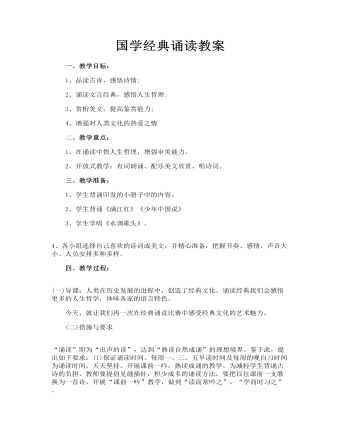
国学经典诵读教案
二、教学重点: 1、在诵读中悟人生哲理,增强审美能力。 2、开放式教学:有词朗诵、配乐美文欣赏、唱诗词。 三、教学准备: 1、学生背诵印发的小册子中的内容。 2、学生背诵《满江红》《少年中国说》 3、学生学唱《水调歌头》。
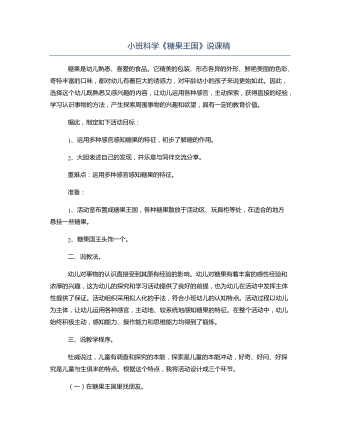
小班科学《糖果王国》说课稿
1、运用多种感官感知糖果的特征,初步了解糖的作用。2、大胆表述自己的发现,并乐意与同伴交流分享。重难点:运用多种感官感知糖果的特征。准备:1、活动室布置成糖果王国,各种糖果散放于活动区、玩具柜等处,在适合的地方悬挂一些糖果。2、糖果国王头饰一个。二、说教法。幼儿对事物的认识直接受到其原有经验的影响。幼儿对糖果有着丰富的感性经验和浓厚的兴趣,这为幼儿的探究和学习活动提供了良好的前提,也为幼儿在活动中发挥主体性提供了保证。活动组织采用拟人化的手法,符合小班幼儿的认知特点。活动过程以幼儿为主体,让幼儿运用各种感官,主动地、较系统地感知糖果的特征。在整个活动中,幼儿始终积极主动,感知能力、操作能力和思维能力均得到了锻炼。
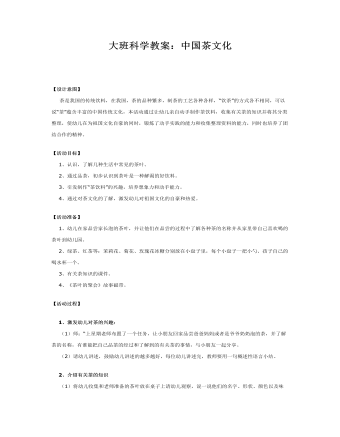
大班科学教案:中国茶文化
【活动目标】 1、认识,了解几种生活中常见的茶叶。 2、通过品茶,初步认识到茶叶是一种解渴的好饮料。 3、引发制作“茶饮料”的兴趣,培养想象力和动手能力。 4、通过对茶文化的了解,激发幼儿对祖国文化的自豪和热爱。【活动准备】 1、幼儿在家品尝家长泡的茶叶,并让他们在品尝的过程中了解各种茶的名称并从家里带自己喜欢喝的茶叶到幼儿园。 2、绿茶、红茶等:茉莉花、菊花、玫瑰花冰糖分别放在小盘子里,每个小盘子一把小勺、孩子自己的喝水杯一个。 3、有关茶知识的课件。 4、《茶叶的聚会》故事磁带。【活动过程】 1、激发幼儿对茶的兴趣: (1)师:“上星期老师布置了一个任务,让小朋友回家品尝爸爸妈妈或者是爷爷奶奶泡的茶,并了解茶的名称,有谁能把自己品茶的经过和了解到的有关茶的事情,与小朋友一起分享。 (2)请幼儿讲述,鼓励幼儿讲述的越多越好,每位幼儿讲述完,教师要用一句概述性语言小结。
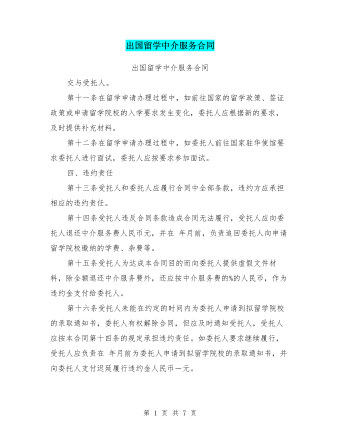
出国留学中介服务合同
第十一条在留学申请办理过程中,如前往国家的留学政策、签证政策或申请留学院校的入学要求发生变化,委托人应根据新的要求,及时提供补充材料。第十二条在留学申请办理过程中,如委托人前往国家驻华使馆要求委托人进行面试,委托人应按要求参加面试。四、违约责任第十三条受托人和委托人应履行合同中全部条款,违约方应承担相应的违约责任。第十四条受托人违反合同条款造成合同无法履行,受托人应向委托人退还中介服务费人民币元,并在 年月前,负责追回委托人向申请留学院校缴纳的学费、杂费等。第十五条受托人为达成本合同目的而向委托人提供虚假文件材料,除全额退还中介服务费外,还应按中介服务费的%的人民币,作为违约金支付给委托人。第十六条受托人未能在约定的时间内为委托人申请到拟留学院校的录取通知书,委托人有权解除合同,但应及时通知受托人,受托人应按本合同第十四条的规定承担违约责任。如委托人要求继续履行,受托人应负责在 年月前为委托人申请到拟留学院校的录取通知书,并向委托人支付迟延履行违约金人民币―元。
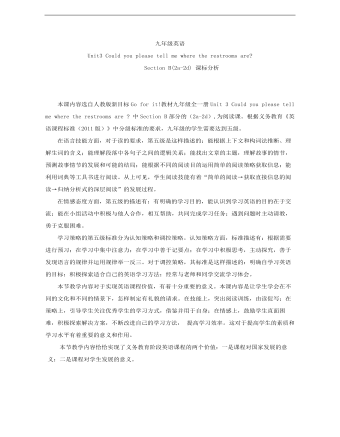
初中英语人教版九年级全册《Unit 3 Could you please tell me where the restrooms are》课标分析说课稿
学习策略的第五级标准分为认知策略和调控策略。认知策略方面,标准描述有:根据需要进行预习;在学习中集中注意力;在学习中善于记要点;在学习中积极思考,主动探究,善于发现语言的规律并运用规律举一反三。对于调控策略,其标准是这样描述的:明确自学习英语的目标;积极探索适合自己的英语学习方法;经常与老师和同学交流学习体会。
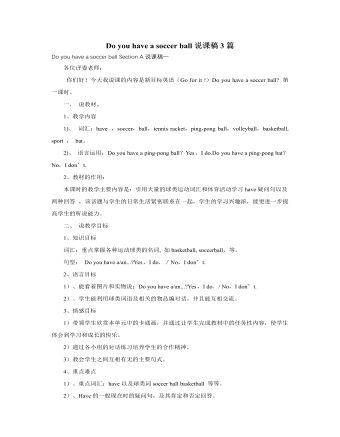
人教版新目标初中英语七年级上册Do you have a soccer ball说课稿3篇
该部分学习内容贴近学生的生活,谈论的主题是符合学生喜爱运动的心理,极易于激发学生学习英语的欲望和兴趣,使他们乐于参与各种英语实践活动。三、教学重、难点及教学突破重点学习运用重点句型Do you/they have… ? Does he/she have…? 语法难点行为动词have的一般现在时的用法;使用do和does引导的一般疑问句的构成和使用。教学突破Section A重在通过使用动词have对物品的所属进行提问和回答的交流式口语活动,学习由助动词do或does引导的一般疑问句的构成以及回答。通过大量和反复地操练以达到运用自如。教学准备教师准备收集课文中所涉及的或学生常见的球类运动器材或有关的教学幻灯片或图片;设计课后巩固练习的幻灯片;制作1a部分的插图和人物对话的课件,将听力部分的内容插人,通过询问对方的所属以及回答来引入新课。

人教版新目标初中英语八年级上册Can you come to my party教案3篇
Step 3 (3b)First, tell the students when we talk about our future plans, we often use: I’m+verb+ing When we talk about what we must do, we use have to. Ask the students to fill in the blanks in 3b. The answers are: shopping, go to see, a test, I’m going, my family. Step 4 (3c)Let the students write an e-mail message to a friend. Say why you can’t visit next. Before the exercise, ask the students to give some possible answers and write them on the blackboard. So the students will feel easy to finish the writing exercise. After they finish it, Let them to correct it in groups first. Each group chooses theirs best one to read in front of the whole class. Step 5 ( planning a party )First read the conversation in the box together. Then ask the students to turn to page 88.Write down everything you have to do next week. Write in all the things you have to do . Ask the students to look at the list. Ask them “What day are you free?” This is when you can have your party. Step 6 (Self check 1 )Let the students to fill in the blanks with the words given. Change the forms of the words if possible. Then make their own sentences. The answers are: visit, playing, have to, study, comeStep 7 (Self check 2)Imagine you are Marie. Read the information and look at your schedule. Write replies to the invitation.
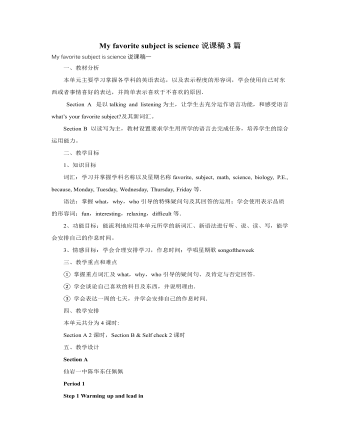
人教版新目标初中英语七年级上册My favorite subject is science说课稿3篇
(四)、归纳总结就学生在语言实践中出现的问题及时进行归纳总结,提醒学生关注。(五)、应用性操练1、填空、(旨在培养学生运用所学知识灵活解决问题的能力。)2、根据问话写答语和根据答语写问话(让学生在理解的基础上灵活运用所学知识,并且有意识地拓展学生思维,让学生不局限于一种答案。)3、翻译句子(旨在培养学生综合运用语言的能力和逻辑思维能力,有意识的培养学生的语感。)八、拓展性训练最后,我设计了这样一个活动,让学生就“最喜欢的动物”“最喜欢的城市”“最喜欢的学科”“最喜欢的季节”“最喜欢的演员”“最喜欢的……”等方面去调查身边的同学,这项活动将学生从最喜欢的学科和老师引向最喜欢的其它事物,引导学生联系上学期所学过的动物、城市、和季节,一方面加强了旧知识和新知识之间的联系,另一方面也拓展了学生的思维,引导学生多角度,多方位的去考虑问题。
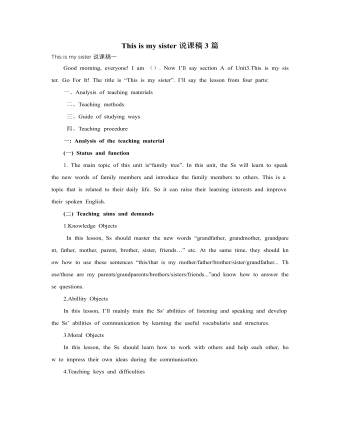
人教版新目标初中英语七年级上册This is my sister说课稿3篇
(四)教具的安排和使用依据英语教学的直观性,趣味性、实践性的教学原则,结合合作学习和任务型教学的新理念,我利用了照片、头饰、幻灯、录音、卡片、竞赛板、等媒体设计教学,学生则利用自制的头饰、家庭照等媒体积极参与教学活动。三.教学程序分析整个教学程序我采用了唱、听、说、玩、演一系列的教学活动,具体设计为热身——新知——趣味操练——巩固练习——总结Step1 课前热身幻灯放映并演唱family songStep 2、新知导入1)教师幻灯出示几张自己的家庭及朋友的照片并介绍This is some photos of my family or my friends. Who’re they? Do you know?自答:This is my father. That is my mother. These are my parents. Those are my friends.…为单词教学做准备的同时,本课重点句型也在情景中被输入。
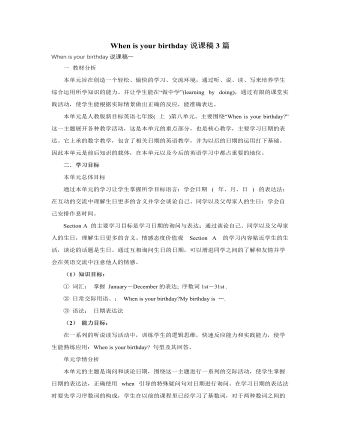
人教版新目标初中英语七年级上册When is your birthday说课稿3篇
一 教材分析 本单元旨在创造一个轻松、愉快的学习、交流环境,通过听、说、读、写来培养学生综合运用所学知识的能力。并让学生能在“做中学”(learning by doing),通过有限的课堂实践活动,使学生能根据实际情景做出正确的反应,能准确表达。本单元是人教版新目标英语七年级( 上 )第八单元。主要围绕“When is your birthday?”这一主题展开各种教学活动,这是本单元的重点部分,也是核心教学,主要学习日期的表达。它上承的数字教学,包含了相关日期的英语教学,并为以后的日期的运用打下基础。因此本单元是前后知识的载体,在本单元以及今后的英语学习中都占重要的地位。 二.学习目标本单元总体目标 通过本单元的学习让学生掌握所学目标语言;学会日期 ( 年、月、日 ) 的表达法;在互动的交流中理解生日更多的含义并学会谈论自己、同学以及父母家人的生日:学会自己安排作息时间。

人教版新目标初中英语八年级上册Could you please clean your room教案3篇
一、 教学内容Section A 1a----1c二、 教学目标1.学习词汇do the dishes, make the bed, take out the trash, fold the clothes, do the laundry, sweep the floor, clean the living room.2.句型 Could you please clean your room? Yes, sure.三、 教学准备 学生预习本单元所有的词汇多媒体课件 活动表 奖品四、 教学过程Pre-task1. Warming upEnjoy ourselves. Watch cartoon Cinderella. 看动画片段《灰姑娘》导如入本课话题和新词汇“chores”美丽善良的鬼姑娘因继母的嫉妒,每天得做所有的家务。片段的主题使学生联想到本课的话题。2. learn new words and phrasesLook! What is she / he dong? 看图学习动词词组do chores, do the dishes, make the bed, take out the trash, fold the clothes, do the laundry, clean the living room.3. Guessing game.What is she doing ? 4. Pair work. 1a, Do you do these things at home? Write “Y” for “yes” and “N” for “no”.5. Listening . 1b , Peter’s chores or Mom’s chores?理解目标语Could you please clean your room? Yes, sure.Write “M” for Mom’s chores, “P” for Peter’s chores in the chart.6. PairworkLook at the picture,Ask your partner to do the chores that you see. 7. Interview Who is the most able at home? 1) What chores do you do at home? How often do you do the chores? Work in four, interview each of the students in the group, fill in the chart.

